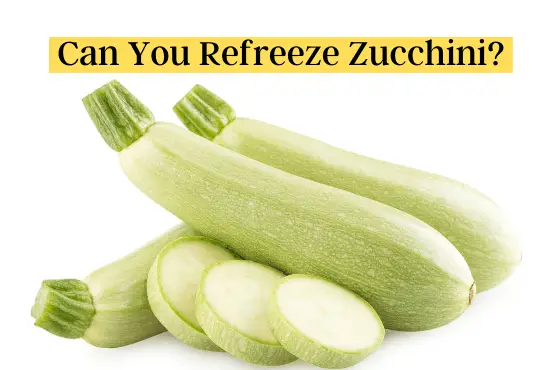Freezing Zucchini is a good way to preserve its rich nutritional components. But when it comes to the frozen texture and safety of the food, you need to carefully follow its thawing and storing procedures.
To save the thawed Zucchini for later use, it is best you figure out the refreezing process and whether it is safe or not?
Refreezing cooked zucchini is safe if it has thawed in a refrigerator and is not already spoiled. However, it is advised to avoid refreezing raw Zucchini, as the quality degradation, in this case, might be extremely high. You can refreeze cooked Zucchini for almost 3-6 months, but refreezing it more than once is strictly not recommended.
Zucchini is not very good at tolerating freezing, but following a few important instructions before refreezing Zucchini can help minimize the taste, texture, and quality loss. So, if you want to learn more about the safe refreezing of Zucchini, make sure to give this article a read.
Table of Contents
Is it Safe to Refreeze Zucchini?
Zucchini is very low in calories and offers excellent health benefits. If you had accidentally thawed a batch of cooked Zucchini in a refrigerator, you could safely refreeze it. However, this is only possible if the Zucchini has partially thawed.
Zucchini that has been completely thawed is not safe for refreezing, so it is better to discard it. The presence or absence of ice crystals on Zucchini will help you decide whether or not you should pop it back into the freezer.
It is also wise to remember that Zucchini stored at a temperature greater than 40 F for more than 2 hours or has reached a warm temperature is not safe for refreezing.
If you want to refreeze the Zucchini, make sure to do it within 2 hours of thawing. If you wait any longer, the microbes and the bacteria start multiplying, resulting in food contamination.
Can You Refreeze Raw Zucchini?
You should avoid refreezing uncooked Zucchini as it is more prone to developing freezer burns. Moreover, raw Zucchini tends to become mushy upon refreezing. When you thaw and freeze it again, you’ll experience an unpleasant taste and texture.
Uncooked Zucchini can be refrozen if you cook it before refreezing, as cooked Zucchini holds up better than uncooked one. Unless you cook it properly, it is not suggested to refreeze it.
How to Refreeze Zucchini?
You can follow the steps mentioned below to ensure the safe refreezing of Zucchini.
- In the case of raw Zucchini, cook it according to your personal preference and let it cool down thoroughly before moving to the next step.
- If you have boiled/steamed Zucchini, dry up the extra water with the help of a kitchen towel.
- Next, place the Zucchini inside an airtight bag or container and seal it once you have removed the excess air. Removing the extra air is very important as it will help you lower the risk of food burn.
- After that, put the packed Zucchini in a freezer-safe bag/container. Double-wrapping will further reduce the risk of air contamination and freezer burn.
- Label the freezer-safe bag with the date of refreezing using a permanent marker.
- Lastly, put the labeled bag in a cold part in the freezer and let it freeze until you are ready to use it.
How Long Can You Refreeze Zucchini?
After refreezing, you can keep cooked Zucchini for 3-6 months in the freezer. While the Zucchini might stay safe for consumption for up to 6 months, it’s recommended to use it up as soon as possible. Because the sooner you eat it, the better the quality.
Refreezing might not make Zucchini unsafe for use. Still, refreezing it will result in a degradation of taste, texture, and quality. If you are not bothered by that, you can refreeze the Zucchini.
After four months, it is advised to discard the Zucchini because it might start spoiling after the 4-month time limit has passed.
Can You Refreeze Zucchini More Than Once?
Refreezing cooked/uncooked Zucchini more than once can be potentially dangerous to you and your health as the second thaw might give room for the bacteria to multiply. It will also break down the cell walls, which will cause the Zucchini to become soft and mushy.
You can refreeze Zucchini in portions if you want to prevent a situation where you have to refreeze the squash more than once. It will enable you to take out and thaw the required portion and save the rest from unnecessary thawing.
Suppose the Zucchini has thawed again despite taking protective measures. In that case, you should toss it out because the nutrients, and the taste of the Zucchini, will have vanished at this point.
How to Know Zucchini Has Gone Bad?
If you have a gut feeling that Zucchini has spoiled, it’s better to trust your gut and get rid of it. But, if you want to make sure you don’t throw Zucchini out while it’s still usable, you can look for a few signs that’ll help you distinguish Zucchini that has gone bad.
If you notice the following signs, it is advised to throw away Zucchini immediately:
- Wrinkled and mushy skin -if the skin appears creasy and crumpled, it is a sign that the Zucchini is on the verge of spoilage.
- Dull/brown color – if you notice the skin color has become dull or it has started turning brown.
- Spots and molds – if you see any molds on the skin of the flesh.
- Slimy/gooey inner – if the inner texture of Zucchini has become slimy/overly sticky.
- Rotten smell – if you notice a foul, pungent odor.
Conclusion
You can safely refreeze partially thawed Zucchini once if it has thawed in a refrigerator. However, in the case of uncooked Zucchini, it is recommended to cook it before refreezing. It will last you for 3-6 months if refrozen carefully. Still, you should try to use it as soon as possible to enjoy the optimum flavor.
While you can safely refreeze Zucchini for as long as six months, sometimes it might spoil earlier. So, if you notice any signs of spoilage, you should discard it right away as eating contaminated food can be harmful to your health.


